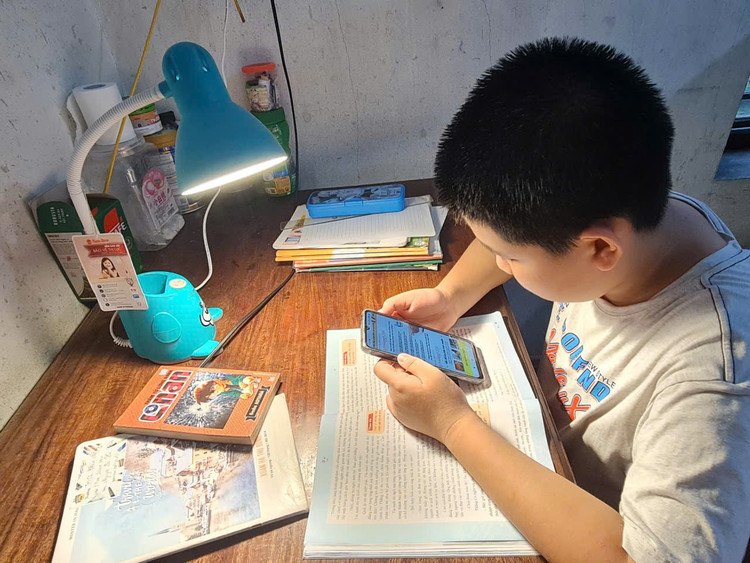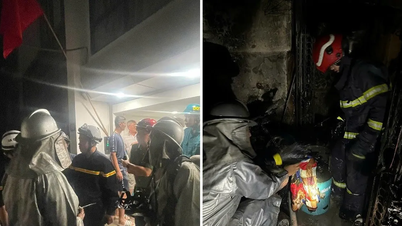Recently, many students have been called by subjects impersonating police officers asking them to "cooperate in investigations" and then lured to motels and hotels to carry out the "online kidnapping" trick. Dr. Dao Trung Hieu, a criminology expert, has thoroughly analyzed the sophisticated manipulation techniques and tricks of this type of crime and given advice on how to avoid it.
Warning of a series of sophisticated "online kidnapping" cases
On August 5, the Criminal Police Department (PC02) of Ho Chi Minh City Police coordinated with professional units to successfully rescue a male student who was "kidnapped online" at a motel in Dak Lak province.
Previously, on the afternoon of August 4, Mr. TVN (born in 1972, residing in Cho Lon ward) reported to Cho Lon ward police that his son TGV (born in 2007, a student at a high school in Ho Chi Minh City) had lost contact. Mr. N. said that before going missing, his son texted via Zalo: "I have some work, I'll go out for a bit and then come back. I'll go have coffee and then come back." From unusual signs, the police determined that V. had taken a taxi to a motel in Tan Lap ward, Buon Ma Thuot city.
Similarly, at the end of July, the disappearance of a 13-year-old girl in Tay Ho ( Hanoi ) also caused a stir in public opinion. She met her "boyfriend" online but had never met him in real life. On the night of July 23, she left home, and the next morning her family reported to the police and posted a search notice on social media. Thanks to a local person who recognized her at Tay Ninh bus station and informed the authorities, she was found before she could continue her journey. On July 27, she returned to Hanoi after a risky 4-day journey.
These cases show that, in the context of strong internet development, children and teenagers can fall into the trap of cybercrime at any time.
Scam scenarios
According to Dr. Dao Trung Hieu, the psychology of students is fear of power, respect for reputation and lack of ability to verify information. When a person claims to be a police officer, speaks in a serious tone, uses technical terms, threatens about "files" or "money laundering lines", the victim easily panics and obeys the request.

The subjects often create scenarios such as: "You are involved in a case", "Need to verify whether your account has been exploited by hackers", or "Transfer money to the agency account to prove your innocence". In a state of fear, if the victim does not share with relatives, it is easy to follow all instructions.
It is worth mentioning that although young people have quick access to the internet and read news constantly, their critical awareness cannot keep up. Children are good at technology but are psychologically immature, easily believing in things that are powerful or urgent. In addition, the lack of family connection makes them face situations on their own, easily falling into traps.
Police do not "invite to work" via social networks
Showing how to identify fake police officers, Dr. Hieu emphasized: "The police do not work via social networks, do not send Zalo "invitations to work", do not ask for money transfers for verification".
Real officers will state their full name, rank, and unit, have the correct summons, stamped with a red seal, and work at the headquarters. On the contrary, scammers often use strange numbers, send links, ask for ID photos, urgently transfer money, or threaten to arrest if they do not comply.
When receiving a suspicious call, the first thing you need to do is stay calm, immediately disconnect, notify your parents or trusted relatives and call the police station in your ward/commune to verify the information. Absolutely do not follow any requests before receiving support from an adult.
Building a “digital immune system” for children
Faced with increasingly sophisticated dangers in cyberspace, Dr. Dao Trung Hieu emphasized that responsibility belongs not only to the authorities but also to the family and school.

Families need to set clear rules about children's phone usage time. Illustration: Mai Loan.
Parents should accompany and support their children instead of applying rigid control measures. Regarding children's phone use, it is time we can no longer hand over phones to children as a tool to 'keep them quiet', but must understand that smart devices are a double-edged sword. Families need to set clear rules about usage time, allowed applications to be installed and need appropriate supervision. Especially for children under 16 years old, the right to privacy must come with the right to protection.
On the school side, social network safety should be considered a mandatory content in the life skills education program. Instead of general slogans, it is necessary to organize specific situational drills, invite experts and police to talk so that students have the reflexes to recognize and handle when faced with fraud.
Authorities must create friendly and easy channels for receiving complaints so that students can turn to them when needed.
Technology is not a direct threat, but gullibility, lack of knowledge and illusion of safety are fatal “gaps”. It is impossible to ban students from using social networks, but it is necessary to equip them with a “digital immune system”, including knowledge, skills and ways to handle risky situations.
“When the whole society joins hands, high-tech criminals, no matter how sophisticated, will find it difficult to approach and deceive our children on the platforms they use every day,” Mr. Hieu emphasized.
Source: https://khoahocdoisong.vn/chuyen-gia-boc-chieu-bat-coc-online-hoc-sinh-post2149044998.html





![[Photo] Prime Minister Pham Minh Chinh chairs the first meeting of the Central Steering Committee on housing policy and real estate market](https://vphoto.vietnam.vn/thumb/1200x675/vietnam/resource/IMAGE/2025/9/22/c0f42b88c6284975b4bcfcf5b17656e7)


![[INFOGRAPHIC] HyperOne Gen 3 Ultra-thin aluminum keyboard for office workers](https://vphoto.vietnam.vn/thumb/402x226/vietnam/resource/IMAGE/2025/9/23/bfc60d4bc2d34b91ae2814802d3d6a5f)























































































Comment (0)